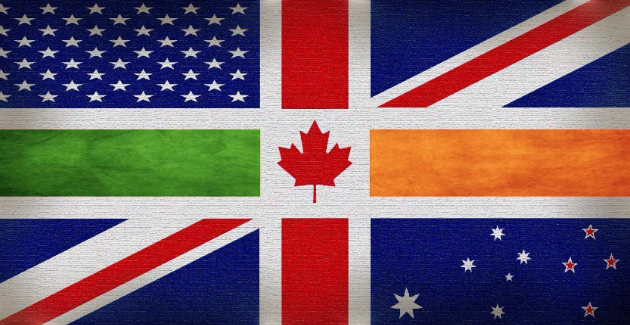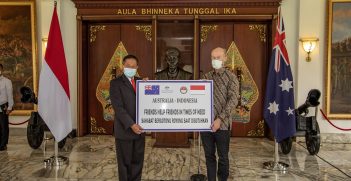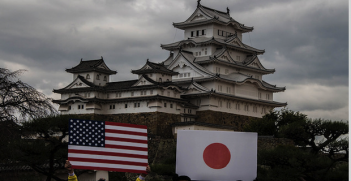Brexit and the Anglosphere Alternative

The UK’s coming departure from the European Union has breathed new life into the concept of the Anglosphere. While it could mean opportunities for Australia to boost its economic ties with Britain, Canberra must also carefully manage relations with the EU.
With the United Kingdom headed to the polls once again on 8 June, its post-EU future is being created before us. Brexit has propelled the United Kingdom and the European Union into flux. This affects Australia, not just because of the important trade and diplomatic relations that we have with the UK and the EU. It affects Australia because we are part of the solution to the UK’s major dilemma: what alterative is there to membership of the EU?
One answer to this dilemma goes by the name of ‘the Anglosphere’: a neologism comprising five core’ states, the UK, the US, Canada, New Zealand and, of course, Australia. Brexit has pushed the concept of the Anglosphere from fringe discussions at party conferences to an ideology that is helping reshape the European and global orders.
Britain, Europe and the Commonwealth
In setting the Labour Party against joining Europe in 1962, the Labour leader Hugh Gaitskell famously said that the British people would not forget the sacrifices of their imperial cousins at Gallipoli and Vimy Ridge. But when push came to shove, their leaders did. The lure of an energetic Europe was greater than that of an enervated Commonwealth. In the early 1990s, regionalism was ascendant: Britain was focused on Europe; Australia was focused on Asia. As the concept of European citizenship deepened, Australians found themselves in long queues at Heathrow.
Following decolonisation, the idea that the Commonwealth might form some sort of alternative to regional integration was at best risible and at worst delusional. Yet gradually things changed. The set of policies and practices that we call ‘globalisation’ made it possible to imagine a community of English-speaking peoples all sharing an understanding about the best relationship between states and markets. Supporters of this idea claimed it made cultural sense for those English-speaking nations at the core of what was labelled ‘the Anglosphere’.
Brexit and the Anglosphere
The Anglosphere idea developed on the right of politics in the late 1990s, during a historic period in opposition to centre-left third way governments. Two high-level conferences with speakers such as Margaret Thatcher, Rupert Murdoch and Conrad Black gave rise to the term, which was popularised by historians Robert Conquest and Andrew Roberts in the decade that followed. The idea of the Anglosphere coalesced out of a series of bilateral relations and from the existing Anglosphere based on the Five Eyes intelligence-sharing network built around the US security umbrella in the Euro-Atlantic region (NATO) and the Pacific (ANZUS).
The invasion of Iraq in 2003—led by the US and supported militarily by the United Kingdom and Australia—put the Anglosphere into the intellectual spotlight. This event was seized upon by the Anglosphere’s proponents as the English-speaking peoples re-assuming their historic role of making the world a ‘safer and better place’.
If the Iraq invasion was the Anglosphere’s first outing in international politics, then the Brexit referendum was its first domestic test. Anglosphere countries featured prominently as alternative models for the UK outside the EU. Canada was held up as what a free trade deal with the EU could look like. Australia’s immigration system was suggested as a suitable way of curbing immigration (even though Britain already had an Australian-style system). President Obama’s intervention failed to move voters and may even have backfired. New Zealand featured when David Cameron’s pre-referendum negotiations were likened to a haka: all mouth and no trousers in the English understanding of the ceremony.
While the Anglosphere only made an explicit appearance at the beginning of the campaign, it was one of Brexit’s big winners at the end. Three members of Theresa May’s first cabinet were supporters of the Anglosphere: Boris Johnson (foreign secretary), David Davies (secretary for exiting the European Union) and Liam Fox (international trade).
But how does the Anglosphere affect Australia? Its most immediate impact will be on Australia’s relations with the EU and the UK as Brexit proceeds. Following Brexit, ‘Global Britain’ is heading our way. Britons had already indicated greater support for free movement within the Commonwealth than within the EU before Brexit. According to a survey by YouGov in 2016, the nation that Leave voters most wanted to sign a free trade deal with was Australia. This might seem like a boon for us, but how Australia handles its relationship with a divorcing couple (with Britain especially making advances) will require some delicate diplomacy. We mustn’t throw the EU baby out with the Brexit bathwater.
Recent changes to citizenship requirements in Australia and New Zealand suggest a policy transfer across Anglosphere states. The Anglosphere has friends in high places: Tony Abbott is a major Australian supporter of the idea. But there is also an observable ‘Anglo-scepticism’ in Australian policy circles. Gareth Evans described the Anglosphere as an “illusion“. Julie Bishop called it a “fantasy“.
Brexit has pushed the idea of the Anglosphere up the political agenda in Britain, Australia and beyond. The Anglosphere may be a fantasy, but it is a fantasy that we now have to live with.
Dr Ben Wellings is senior lecturer in politics and international relations at Monash University. Along with Andrew Mycock (University of Huddersfield) and Michael Kenny (Queen Mary University of London), he is convening a major international conference on the Anglosphere at the British Academy in London on 15-16 June.
This article is published under a Creative Commons Licence and may be republished with attribution.





